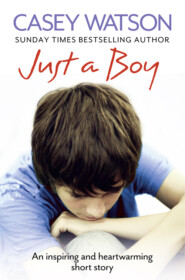По всем вопросам обращайтесь на: info@litportal.ru
(©) 2003-2025.
✖
Triumph Over Adversity 3-in-1 Collection
Настройки чтения
Размер шрифта
Высота строк
Поля
I rolled my eyes. ‘Of course not, silly,’ I told him. ‘There’s nothing wrong with her throat. It’s just that she can’t speak.’
‘So she must be a baby, then. Either that or a dummy,’ he added disdainfully.
I skewered him on the end of one of my disapproving looks. ‘Henry, what have we been talking about since you came back from lunch? Difference. All the things that make everyone different from everyone else. Your lovely strawberry blond hair, for example. Ben and Gavin don’t have that, do they? And I bet they think your hair is far more interesting than theirs.’
‘No they don’t,’ he huffed. ‘They call me microphone head, Miss. Well, not no more, actually, ’cos I beat them to a pulp.’
I shook my head at the very young teenager sitting before me. The thing you couldn’t miss about Henry travelled everywhere with him – that huge chip that was weighing down his shoulder, as the result of being at the bottom of such a big pile of brothers, and lacking any sort of father figure in his life. That and his hand-me-downs and general struggle to make his voice count at home sometimes made for a very angry young man.
I knew I was last-chance saloon where Henry was concerned. If he didn’t change his fighting ways, he’d be permanently excluded, and I felt sorry for him. I had a bit of a soft spot for him too.
I looked at him now. ‘Henry,’ I chided, ‘I know you didn’t beat those boys up, just like I know that, being the oldest here, you’re going to step up to the plate. You’re going to help me, aren’t you? Help make sure that Imogen doesn’t get a hard time? Point out to the younger ones that she’s just a little different – can you do that? I can count on you to do that for me, can’t I?’
I watched Henry digest this and break into a grin. ‘I can be like your terminator, Miss, can’t I? If the others pick on her I can zap them with my bionic arm, can’t I? They’d soon stop saying stuff then, wouldn’t they?’
I laughed. ‘Er, I don’t think I want you to be doing any zapping. But it would be a great help if you could just watch over her for a few days – you know, when I’ve got my back turned and stuff.’
This seemed to make him happy, because as he walked back to the group, his shoulders high, he announced that, as the oldest, he was officially looking out for the new girl. ‘So no funny business,’ he said, before turning back to me. Upon which he winked. I had to stop myself from laughing out loud.
Gavin’s take on the apparent oddity was more practical. After a barrage of questions – Why couldn’t she talk? Had she got ADHD? Was she ‘on meds’? – he had the solution. ‘You should give her some Ritalin,’ he observed. ‘That’ll sort her out.’
One of my rules, given that I tended to spend my days with challenging children, was that easier-said-than-done-thing at the end of the working day of making a determined effort to take off my ‘miss’ hat and put on my ‘mum’ one.
I always smiled to myself at school when the kids themselves found it difficult; when – at least at the beginning of the day, anyway – they would accidentally call me Mum instead of Miss. They’d always blush then, often furiously, but I took it as a compliment. I’d never wanted to be the sort of teacher who kept such a distance from their charges that it was a mistake that no child would ever make. Quite the contrary – I took these slips as evidence I was working in the right job; that I was someone they felt comfortable around. That was important – if they were comfortable enough to forget themselves around me then I would be in so much better a position to support them. Which could make the difference, in some cases, between returning to mainstream classes, back among peers, learning, and travelling even further down the road to isolation.
And I also knew that my drive to help them was partly as a consequence of seeing first hand how much that mattered, through helping Kieron with the many challenges of growing up with Asperger’s.
Which he was still doing, as I observed when, letting myself into the house and slipping off my coat and shoes, it was to find him slumped on the sofa in front of the telly, as was currently his habit.
He was waiting, I knew. Waiting for me to come in and give him his tea, before Mike and Riley both got home from work. I went into the kitchen and pulled out a plate and some cutlery.
‘Honestly,’ I called to him as I dished out some casserole from the slow cooker, ‘why you can’t wait till the others get home is beyond me, Kieron. And if you can’t wait, you could at least get off the sofa and help yourself to something.’
He looked across and gave me one of his pained looks as he turned down the TV volume. ‘Oh, Mum,’ he moaned. ‘Don’t get on at me. I’m stressed out enough as it is!’
‘And what exactly have you got to be stressed about?’ I asked him as I took the bowl of steaming casserole through to the dining-room table. I had strict rules about the eating of meals and where it was allowed to happen, even if I was generally a little on the soft side when it came to my son. ‘Come on,’ I said. ‘Come through here and eat this before it gets cold. So, tell me,’ I added as I set it down, and glancing at the evidence of a day spent mostly watching telly rather than career planning, ‘have you thought any more about what you’re going to do?’
Kieron scraped back a dining chair and plonked himself down wearily. ‘Oh God, Mum,’ he stropped. ‘Five minutes you’ve been in and already you’re getting on at me!’
I ruffled his hair and pulled a chair out. My cup of coffee could probably wait. ‘Sorry, love,’ I said. ‘I don’t want to get on at you. I want to help you. Dad and I were only saying this morning, perhaps we could sit down with you this evening – you know – go through some options with you maybe? It’s no good for you, this – sitting around on your own all day, moping. You’ll just get fed up, and you know what you’re like – next thing, you’ll end up getting in a state.’
He shovelled in a couple of mouthfuls before replying. He could eat for Britain could Kieron. ‘I’m not in a state, Mum – I’m just bored. And I don’t mean to snap. It’s just that Jack and James and Si – they’ve got stuff going on, haven’t they? Jack’s got his new job, the others are at college …’ He trailed off, and downed another mouthful. ‘And it’s like … well, it’s like it’s all right for them because they know what they’re doing – and they know because they can all do stuff. But I can’t. I don’t think I can do anything that real grown-ups do. I’m crap at all that.’
‘Nonsense!’ I said firmly. It was a familiar refrain lately. As soon as he thought about the change inherent in making such big decisions, he took the safer route – putting it off for another day. ‘Kieron,’ I told him, ‘you are not “crap”, and of course you can do things.’
He could, too. Though his GCSE results had disappointed him, being mostly Ds, it wasn’t as straightforward as it might have been. He’d struggled with dyslexia since primary school and his diagnosis of Asperger’s had only come in the last two years, meaning valuable time and support that could have helped him achieve higher grades hadn’t been available to him till much later in his school life. That he was capable of more wasn’t in doubt – the teachers had all said so. I reiterated that fact again now. ‘You can do anything you set your mind to,’ I told him. ‘You just have to decide what it is you want to do, that’s all. And that’s what you have to put your mind to – deciding – not avoiding. Which is why you and Dad and I need to sit down and have a proper talk. Anyway, right now I’m off upstairs to change and have a shower before they’re back. And make sure you put that plate back when you’re done, okay? Okay?’
‘Um, oh, yeah. Will do,’ he said, having, in typical teenage boy fashion, already tuned me out in favour of the bit of programme he could still see through the glass doors between the table and the telly.
Honestly, I thought to myself as I headed up the stairs, if anyone had told me when they were little that I’d be worrying about my kids so much at this age, I’d have thought they were mad. But of course, I’d been wrong – older didn’t necessarily mean less difficult to parent. It was just that you did your worrying on a different level.
But at least Kieron could communicate his worries – well, up to a point and after a fashion anyway. I thought back to the anxious-looking little girl who’d be joining my class the following morning. How could she be helped in her troubles – and she clearly had some troubles on her shoulder – if she couldn’t communicate anything to anyone?
Chapter 4 (#uc374aa13-50dd-54e0-95f2-ea1005475a74)
I was feeling lighter of heart as I walked into school the following morning, at least where Kieron was concerned. Where I had only prompted mild teenage disgruntlement, Mike had produced progress, and we’d all gone to bed with a plan that seemed workable – for Kieron to at least think about exploring the possibility of applying to the local college to do a two-year course in Media Studies, with an emphasis on music production.
It had been a friend of Mike’s from work that had suggested it. His son had just finished one and had really enjoyed it, and, better still, it had clearly served him well. He was now doing an apprenticeship with a theatre group in London, learning how to produce music for shows.
Mike had done a soft-sell on it, knowing that to go in guns blazing would be likely to make Kieron anxious by default. Instead, he couched it in terms that made it sound more like a hobby he could dabble in than an actual college course. After all, he loved music as much as he loved football and superheroes (i.e. a lot), and once we looked into things further and found the teaching style was mostly small-group based, it began to seem much less daunting than he’d originally thought. He was still reticent, but he was also asking questions, at least, which was an encouraging development. But now came the biggie: his task for today was to take the bold and scary step of phoning the admissions office to try and make an appointment.
Whether he’d have managed it by the time I got home from work remained to be seen. I felt hopeful, though, and able to turn my attention to the probably equally scared young girl who was joining us today.
I could see Imogen and her grandmother when I walked into reception. They were seated in the corner, on the small sofa that was stationed there for the purpose, and both silently watched my progress through the double doors.
I was pleased to see they’d arrived early as it would be much less daunting for Imogen if she could come straight to my classroom with me than run the gamut of all the other kids arriving.
I raised an arm and waved. ‘Morning!’ I called to them, smiling. They both stood as I approached, as if to attention.
Mrs Hinchcliffe was holding Imogen’s arm protectively, but it was clear she was keen to be gone. ‘Do I have to stay with her?’ she asked me, having acknowledged my greeting.
I shook my head. ‘No, no, that’s fine,’ I told her. ‘Imogen can come with me now.’ I turned and met her gaze. ‘Okay? And will you be picking Imogen up again?’ I asked Mrs Hinchcliffe, ‘or will she be making her own way home?’
Imogen’s grandmother shuffled, a touch uncomfortably, I thought, before she answered. ‘No,’ she said, finally. ‘She knows her way home. It’s only five minutes away. And she won’t want me here, I’m sure. Showing her up …’
Now it was my turn to feel uncomfortable. It really did feel odd to be talking about this girl as if she was an inanimate object. ‘Okay, then,’ I said. ‘Well, we’ll be off then, shall we, Imogen? And I’ll see you, well … whenever, Mrs Hinchcliffe. Though it occurred to me that perhaps we could speak on the phone later – have a bit of a catch-up? If that’s all right.’
She seemed a little surprised at my suggestion, but said that, yes, it would be fine, then headed back out into the warm autumn sunshine, throwing a ‘Be good, Imogen’ back towards us by way of a goodbye.
I’d already decided to skip my usual half-hour in the staffroom and as we were in school so early – there were still ten minutes to go till the bell went – take the opportunity to acclimatise Imogen to her new surroundings before the other children all came crashing in.
‘Come on,’ I told her now, beckoning her towards the doors to the main corridor. ‘Follow me.’
She seemed reluctant to make eye contact, but fell into step with me, chin very firmly on chest. But not before I could see the strange blank expression that had now taken over her face. It really was mask-like; as if, now Nan had gone, a shutter had come down. It made the silence between us feel even more uncomfortable.
I chatted as we walked, trying to fill it. I told her about my own children, and how I would have been in school before her and her Nan were, had it not been for my daughter Riley and her scattiness in the mornings and how this particular morning she’d had us all in a spin, rushing around trying to find her a pair of her ‘stupid’ tights. I kept glancing at Imogen as I spoke, but it wasn’t clear that she was even listening, since there was no response at all.
‘There are going to be five other children joining us in a bit,’ I went on. ‘Three boys, two other girls – and they’re all looking forward to meeting you. I think you’ll like them – particularly the girls, Molly and Shona. They’re a little younger than you – Shona’s in year 8 but Molly’s still in year 7 – and they’re both lovely girls.’
The walk wasn’t a long one, but it seemed so. It was a strange business, inanely chirping away to a girl who seemed not to want to listen or respond. And I wondered – what was going through her head right now? Still, my research had told me that this was the right thing to do – just keep on talking, even if it was into a void. And that, I thought, as we reached my classroom, I was good at.
‘Here we are!’ I said, as we approached the door. ‘My little kingdom!’
It was something to see, too – a proper work of art. In contrast to every other classroom door in the school, mine was highly decorated; covered, top to bottom, in daffodils and daisies, all painted by various children who had passed through it and all cut out and covered in sticky-back plastic, in traditional Blue Peter style. A work of art in its own right, everyone in school commented on it, and I was pleased to see it prompt a reaction. No, not in words, but Imogen did seem to do a bit of a double-take on seeing it.
‘We’ll have to get you to paint a flower for it, too, eh?’ I told her as I unlocked it. I laughed. ‘I think there’s just about room!’
Again, there was almost nothing in the way of a response, and it was an equally odd business trying to do my usual welcome spiel. I ushered Imogen to a seat, and as I proceeded to point out the various aspects of the classroom I felt increasingly like an air hostess – one who was trying to keep the attention of my single indifferent passenger, who only glanced up occasionally and apparently indifferently.











